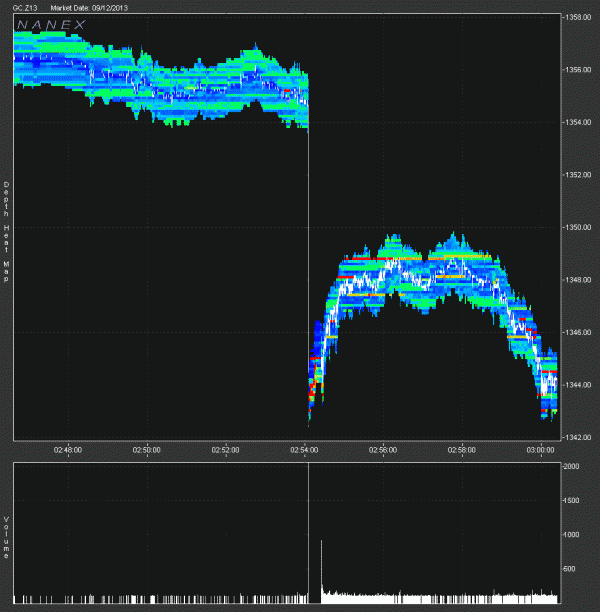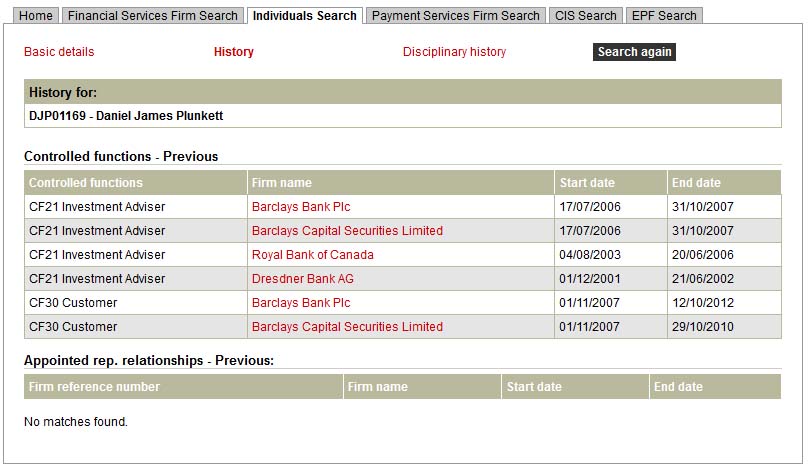– Barclays Fined For Manipulating Price Of Gold For A Decade; Sending “Bursts” Of Sell Orders (ZeroHedge, May 23; 2014):
It was almost inevitable: a week after we wrote “From Rothschild To Koch Industries: Meet The People Who “Fix” The Price Of Gold” and days after “Barclays’ Head Of Gold Trading, And Gold “Fixer”, Is Leaving The Bank“, earlier today the UK Financial Conduct Authority finally formalized what most in the “tin-foil” hat community had known for years, when it announced that it fined Barclays £26 million for manipulating “the setting of the price of gold in order to avoid paying out on a client order.” Furthermore, the FCA confirmed that those inexplicable gold raids which come as if out of nowhere, and slam gold with a vicious force so strong sometime they halt the entire market, had a very specific source: Barclays, whose trader Daniel James Plunkett, born 1976, “sent out a burst of orders aimed at moving the price of the yellow metal.”
This took place for a decade. As the FT reports:
The FCA said Barclays had failed to “adequately manage conflicts of interest between itself and its customers as well as systems and controls failings, in relation to the gold fixing” between 2004 and 2013.
Some further details on Plunkett’s preferred means of manipulating the gold price.
The FCA said Mr Plunkett had manipulated the market by placing, withdrawing and re-placing a large sell order for between 40,000 oz and 60,000 oz of gold bars.
He did this in an attempt to pull off a “mini puke”, which the FCA took to mean a sharp fall in the price of gold. As a result, the bank was not obliged to make a $3.9m payment to the customer under an option contract.
Which is precisely what we have shown many times here for example in “Vicious Gold Slamdown Breaks Gold Market For 20 Seconds“, when a sell order so aggressive comes in it not only takes out the entire bid stack with an intent not for “best execution” but solely to reprice the market lower. Recall from September:
There was a time when, if selling a sizable amount of a security, one tried to get the best execution price and not alert the buyers comprising the bid stack that there is (substantial) volume for sale. Of course, there was and always has been a time when one tried to manipulate prices by slamming the bid until it was fully taken out, usually just before close of trading, an illegal practice known as “banging the close.” It appears that when it comes to gold, the former is long gone history, and the latter is perfectly legal. As the two charts below from Nanex demonstrate, overnight just before 3 am Eastern, a block of just 2000 GC gold futures contracts slammed the price of gold, on no news as usual, sending it lower by $10/oz. However, that is not new: such slamdowns happen every day in the gold market, and the CFTC constantly turns a blind eye. What was different about last night’s slam however, is that this time whoever was doing the forced, manipulation selling, just happened to also break the market. Indeed: following the hit, the entire gold market was NASDARKed for 20 seconds after a circuit breaker halted trading!
To summarize: a humble block of 2000 gold futs (GC) taking out the bid stack, and slamming the price of gold, managed to halt the gold market: one of the largest “asset” markets in the world in terms of total notional, for 20 seconds.
And Mr. Plunkett in action:
To be sure Barclays was truly sorry, and pinky swears that having been caught manipulating the gold market for ten years it will never do it again:
The news is also a fresh blow to Barclays’ chief executive Antony Jenkins as he tries to overhaul the culture of the London-based lender. Mr Jenkins took over 18 months ago after his predecessor, Bob Diamond, stepped down amid the Libor scandal.
Analysts said the fine reflected badly on the industry – as well as the hard-charging, revenue-focused business model that Barclays had previously been operating.
Mr Jenkins said in a statement on Friday: “We very much regret the situation that led to this settlement?.?.?.?These situations strengthen our resolve to improve.” The bank discovered the misconduct after the client complained. It then reported the incident to the regulator, for which it received a 30 per cent discount on its fine for co-operation.
Ian Gordon, analyst at Investec, said that in pure financial terms, the fine was “utterly inconsequential, both in a group context, and in relation to the quantum of other conduct costs”. He was referring specifically to the bank’s provisions for the mis-selling of payment protection insurance and interest rate hedging products
So a wrist slap, we get that. One wouldn’t expect more – after all the banks run the show. And yet, one wonders: is this just a case of “Fab Tourre-ing” the scandal, and redirecting all attention to just one (preferably junior) person? To be sure, this one trader made handsome profits from gold manipulation…
Mr Plunkett boosted his trading book by $1.8m at the expense of a customer, who was later compensated. He has now been banned from “performing any function in relation to any regulated activity” and fined £95,600. At the time, Barclays was one of five banks that set the price of the precious metal twice a day. Tracey McDermott, the FCA’s director of enforcement and financial crime, said: “A firm’s lack of controls and a trader’s disregard for a customer’s interests have allowed the financial services industry’s reputation to be sullied again.”
… but is this just an attempt by the FCA to pass this off as the proverbial “only cockroach”, especially when as we reported earlier this week, none other than Barclays head of trading Marc Booker quietly left dodge?
The speculation is further heightened when one considers that Plunkett had left Barclays nearly two years ago in October 2012! According to his FCA record:
Prior to Barclays Plunkett worked as a lowly junior trader at Dresdner and RBC – and this is the a manipulation mastermind? Further, considering the FCA found failures at Barclays starting in 2004 and Plunkett only joined in 2006, can the FCA please disclose who else was the frontman for gold manipulation at Barclays in the 2004-2006 period?
This is what the FCA had to say on the matter of young master Plunkett:
Plunkett was a Director on the Precious Metals Desk at Barclays and was responsible for pricing products linked to the price of precious metals and managing Barclays’ risk exposure to those products.
Plunkett was responsible for pricing and managing Barclays’ risk on a digital exotic options contract (the Digital) that referenced the price of gold during the 3:00 p.m. Gold Fixing on 28 June 2012. If the price fixed above US$1,558.96 (the Barrier) during the 3:00 p.m. Gold Fixing on 28 June 2012, then Barclays would be required to make a payment to its customer. But if the price fixed below the Barrier, Barclays would not have to make that payment.
During the 3:00 p.m. Gold Fixing on 28 June 2012, Plunkett placed certain orders with the intent of increasing the likelihood that the price of gold would fix below the Barrier, which it eventually did. As a result, Barclays was not obligated to make the US$3.9m payment to its customer, and Plunkett’s book profited by US$1.75m (excluding hedging), which was in addition to an initial profit that his book had received upon the sale of the Digital.
Very shortly after the conclusion of the 3:00 p.m. Gold Fixing on 28 June 2012, the customer became aware that the price had fixed just below the Barrier and sought an explanation from Barclays as to what happened in the Gold Fixing. When Barclays relayed the customer’s concerns to Plunkett on 28 and 29 June 2012, he failed to disclose that he had placed orders and traded during the Gold Fixing. Further, Plunkett misled both Barclays and the FCA by providing an account of events that was untruthful.
Plunkett’s misconduct is particularly serious because he preferred his interests over those of a customer and his actions had the potential to have an adverse effect on the Gold Fixing and the UK and international financial markets.
It would appear that Plunkett is indeed nothing more than another instance of “Kerviel” or “Tourre” – an irrelevant mid-level trader thrown at the wolves of public consumption just so the attention can be redirected from the real manipulation elsewhere, and much higher up.
This is hardly surprising, as we noted three days ago when we wrote about the Barclays head gold trader termination:
“Bottom line: just like the Silver Fixing which last week announced its winddown, the days of the 117-year-old Gold fix are numbered. But to preserve continuity of riggedness and manipulation, perhaps they can just outsource their job duties to the biggest manipulators of all: Bank of England, the Fed and, of course, the BIS.”
So yes: it is now a fact that gold is manipulated by various commercial banks, and that those gold “raids” one sees every morning usually around the time of the London fix aren’t accidental at all but are entirely designed to reprice the market, but how deeper does the rabbit hole go?
[FCA Director Tracy] McDermott added: “Firms should be in no doubt that the spotlight will remain on wholesale conduct and we will hold them to account if they fail to meet our standards.”
Alas, this is a lie – by handing Plunkett to the public on a silver platter, it simply means that the far bigger and more important players in the gold manipulation market – stretching all the way to central bank and, of course, bank of central bank level, will simply be allowed to continue business “as usual.”
So for those who want the real people behind the real manipulation before they all scatter into the dust, we urge you to reread “From Rothschild To Koch Industries: Meet The People Who “Fix” The Price Of Gold.” Because the gold manipulation rabbit hole goes far, far deeper than just one single, solitary trader…



Barclays has fallen a long way since I was young…….it is going to collapse, along with many other banks. One more empty shell…..
It’s not only Barclays bank that has manipulated the price of gold. Others do the same but haven’t been caught yet.